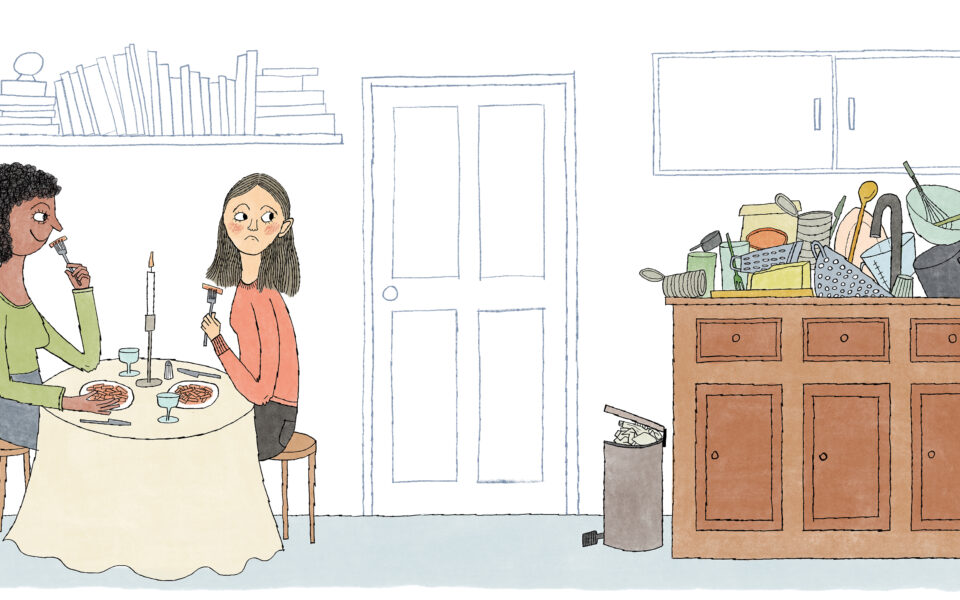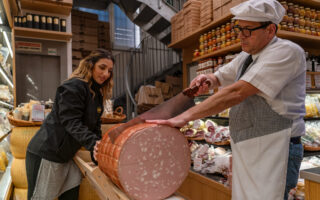I love you, but I hate your cooking

When Marta Hurgin first met Lisa Wolford, she loved Wolford’s sharp legal mind, her sense of humor and her empathy toward animals. And Hurgin even accepted that Wolford’s favorite food was chicken, though, as a vegetarian, she couldn’t quite understand it. The two lawyers began to date, and soon, in pursuit of domestic bliss, they moved in together in rural New Hampshire.
And blissful it was – until Wolford began to volunteer for dinner duty. “It always had to be a really complicated recipe,” Hurgin, 37, said. “Like when she makes lasagna, somehow it involves individually boiling every lasagna sheet and laying them all over the countertop. I really do have to leave the kitchen.”
While Hurgin, who made most of the couple’s meals, was an efficient and intuitive cook who cleaned as she went, Wolford, 59, cooked as if she were being held at knifepoint. She would embark on harried trips to the store for ingredients she’d never use again, nervously adhere to each step of every recipe and dirty most of the pots and pans in the kitchen. Soon, it became clear: Hurgin loved her partner. But the way her partner cooked? Not so much.
The two are in good company – or bad, depending on how smoothly you think dinner at home should go. As domestic roles continue to evolve, a common dynamic has emerged: People in relationships may really, really get along, but in the kitchen, they cannot share the stovetop without losing their minds.
The kitchen presents a hotbed of culinary disputes and differences to navigate, up to three times a day: One partner scarfs down nonfat Greek yogurt, and nonfat Greek yogurt alone, in the pursuit of protein gains, while the other prefers cooking from Julia Child’s tome of elegant epicurean pleasure. One partner can’t stop quoting “The Bear” as he chops with more bluster than skill, while the other has line cook experience. One partner, as in the case of David Barto, might relish a perfectly cooked New York strip, while the other has sworn off red meat.
Barto, 65, who lives in Poway, California, “had a whole lifetime” with his gourmand wife, who died in 2022. Several months into a new relationship with someone who mostly consumes salad, he has had to adopt new ways of cooking. “She won’t even eat chicken thighs,” he said of his new partner.
And then there is the issue of control – and the back-seat cheffing it perpetuates. Like the sort that Alex Jung tries their best to curb when their partner borrows their KitchenAid mixer or endeavors to riff on cake recipes in their Ridgewood, Queens, home. “I have this tendency to get high and mighty about baked goods,” Jung, 30, said. “I need to let go of the reins a bit.”
Relationship therapists agree: Food fights tend to be a stand-in for deeper relational issues. “It’s not just about food,” said Orna Guralnik, a clinical psychologist in New York City who stars in the Showtime docuseries “Couples Therapy.” “It’s about your ideology of what a good life is.”
“When two people come together, they’re bringing together two cultures,” said Alexandra Solomon, a clinical psychologist and the author of the relationship self-help book “Love Every Day.” Their “big C” culture includes “ethnicity, geography of family of origin and legacy around foods they identify as comfort foods, celebration foods and taboo foods.”
“And they also come in with ‘little C’ culture,” she said. “Do you have the TV on while eating? Do you leave the dishes in the sink overnight? The idiosyncratic things their family did.”
“Big C” culture immediately reared its head when Michelle Lee moved in with her partner in Vancouver, British Columbia, in 2022. Lee, 24, began cooking to channel nostalgia for the Korean flavors of her youth. But family holidays with her partner suddenly meant an immersion into what she calls “white Canadiana” food, like the orange salad – Jell-O, cottage cheese, Cool Whip, crushed pineapple and mandarins – that he requested she make for Thanksgiving.
When Paasha Motamedi and Sofia Greer moved in together in New York’s Brooklyn Heights, a more unusual squabble arose within a few months: Motamedi, a poet and painter, got into baking bread “really hard, really quickly.” He’d bike through several neighborhoods to the now-closed Gristmill in Park Slope for freshly milled heritage flour blends and leave “little bits of dough everywhere,” including in the bathroom. He soon turned the refrigerator into a losing game of Tetris, with many large containers of dough bulk-fermenting at a time.
“And then the pizza baking started,” Motamedi, 34, said. “And that was a whole other thing.”
“One day, I came home and lifted up the bed covers to take a nap on a Sunday,” said Greer, 32. “There were literally bowls of dough with towels over them under the comforter. I was like, ‘Bro, no.’ I couldn’t even be mad, though. I was like, ‘At least something’s rising in this bed.’”
The breaking point came when Motamedi started a fire while trying to make a cornbread with duck fat and orange gastrique for a friend’s dinner party. “I looked at her through the smoky haze in the apartment and said, ‘Do I still make it?’” he said. Greer emphatically said no. They brought wine to dinner instead.
They have since broken up, though they remain close friends. Motamedi has carried hard-won lessons about how to be thoughtful when he cooks or bakes for his new partner. Recently, he made her pizza. “I got sauce on the walls,” he said. “But I wiped it as I was cooking. I did learn.”
For writer Molly Roden Winter, 51, a mutual dislike of cooking in her relationship led to an unexpected discovery after she and her husband decided to open their marriage. Ethical non-monogamy not only expanded Roden Winter’s emotional and sexual life; it also allowed her to feel cared for in a way she did not at home.
“There are so many ways to be intimate with another person,” said Roden Winter, whose boyfriend goes out of his way to find gluten-free crackers that suit her dietary needs when he prepares charcuterie boards for her visits. “Sex is one of them, but eating is very intimate. It’s a thing that sometimes feels like a bigger deal in a way that can be surprising.”
Solomon said communicating – preferably not when an argument is fresh – is paramount for couples who wish to overcome their kitchen woes. “The nice thing about cooking is that couples can work on making tweaks,” she said. “We have days and weeks and months and years to refine how we do this.”
For Barto, aging made him more patient and accepting of his partner’s preferences. “You no longer have the option of saying, ‘I can change that person, because we’re only 22,’” he said. “I’m trying to fit into what her life is, and have her fit into what my life is. If you like them, you like all of them, and that includes some things that aren’t perfect.”
Hurgin and Wolford, the lawyers, said an open dialogue has certainly proved useful.
“We’ve reached an understanding which involves having a sense of humor about our differences,” Hurgin said.
To her credit, Wolford has made a concerted effort to learn to clean as she goes. But she still can’t quit those panicked trips to the store for bags of nigella seeds and pomegranate syrup she’ll use a single tablespoon of – and never touch again.
This article originally appeared in The New York Times.






